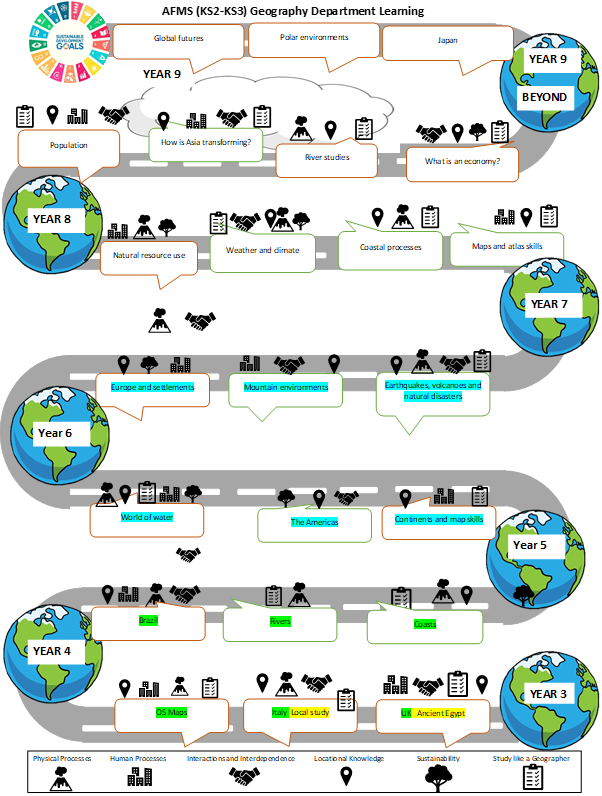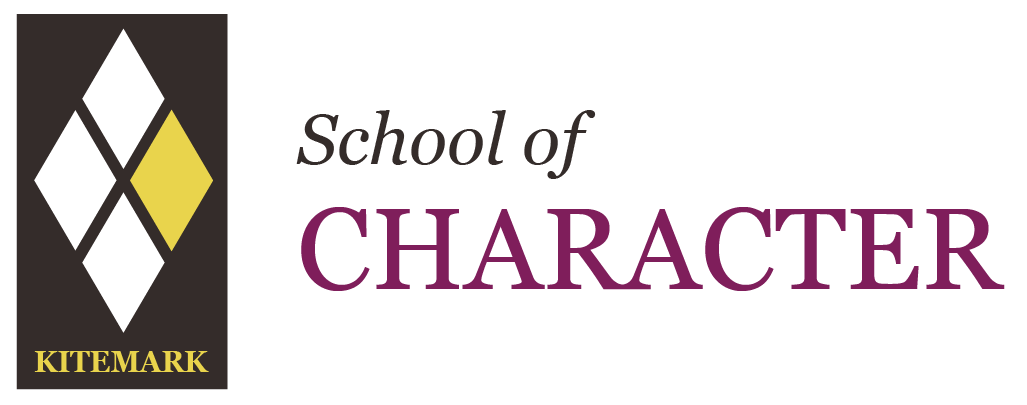Geography
Intent
he study of geography stimulates an interest in and a sense of wonder about places. It helps young people make sense of a complex and dynamically changing world. Geography inspires pupils to become global citizens by exploring their own place in the world, their values and their responsibilities to other people and to the environment. We tackle issues at a variety of scales using a variety of approaches, including group work, decision making, independent learning and research tasks with the use of IT.
At Aston Fields Middle School, pupils are introduced to key geographical skills which allow them to explore the links between our environment, the way we live our lives and the impact we have on the world. Over their four years here, pupils develop a deeper understanding of the world around us, building on their ability to apply these skills to a range of interesting contexts. Throughout all lessons, pupils are encouraged to develop key character skills including perseverance, motivation, ambition and respect.
- Develop their contextual knowledge of the location of globally significant places – both terrestrial and marine – including their defining physical and human characteristics and how these provide a geographical context for understanding the actions of processes.
- Understand the processes that give rise to key physical and human geographical features of the world, how these are interdependent and how they bring about spatial variation and change over time.
- Throughout the geography curriculum pupils are given the opportunity to be competent in the geography skills needed by being taught to:
• analyse and communicate with a range of data gathered through experiences of fieldwork that deepen their understanding of geographical processes.
• interpret a range of sources of geographical information, including maps, diagrams, globes, aerial photographs and Geographical Information Systems (GIS).
• communicate geographical information in a variety of ways, including through maps, numerical and quantitative skills and writing at length.
Cultural Capital
Students develop a wide range of rich cultural capital through the Geography curriculum. Students develop and extend their knowledge of locations, places, environments and processes, and of different scales including global; and of social, political and cultural contexts (know geographical material). In Geography, students gain an understanding of the interactions between people and environments, change in places and processes over space and time, and the inter-relationship between geographical phenomena at different scales and in different contexts. (Think like a geographer). Through the Geography curriculum, we create successful learners who develop an inquisitive interest in their surroundings. We ensure that students are able to write well-organised, balanced and structured arguments using valid evidence, which are key skills they will rely upon in later life, regardless of their chosen pathway.
Reading in Geography
https://www.nationalgeographic.com/ is an excellent way to read articles dedicated to geography.
Reading some of the resources at https://www.coolgeography.co.uk/ will help broaden knowledge on a variety of geographical topics.
Stay up to date on current affairs in the UK and around the world by visiting https://www.bbc.co.uk/news
Using https://www.bbc.co.uk/bitesize will help complete work using specific geographical detail.
Implementation
Key Stage 2
Pupils have an independent geography lesson for one hour a week. Through an exciting curriculum, pupils see the relevance of their learning experience and help them to relate knowledge gained in different subject areas. Pupils extend their knowledge beyond the local area to include the United Kingdom and Europe, North and South America and beyond.
Year 5
Continents and map skills - Study of our world’s continents and oceans. Pupils will develop their knowledge of the world and important map reading skills.
The Americas – In this topic pupils will develop a knowledge about the continents of North and South America and will learn in more detail about the geographical and cultural importance of Brazil.
Water use and rivers – Pupils will learn all about how important water is and water use differs around the world. They will then study rivers and explore their journey from source to mouth.
Year 6
Europe and settlement – Study of Europe and discover more about the continent we live in. Pupils will then continue to investigate settlements and look further into what our sustainable cities of the future will look like.
Mountains – A study of physical geography exploring how mountains are formed, the process’ involved and how humans interact with mountains.
Volcanoes, Earthquakes and natural disasters - Pupils will look at the how and why we have volcanoes and earthquakes and the impact they have. They will continue by looking at a range of other natural disasters and how they can be managed.
Key Stage 3
In KS3, pupils continue to be taught geography discreetly and extend their knowledge of the world’s major countries and their physical and human features. They build upon their work in KS2 to understand how geographical processes interact to create distinctive human and physical landscapes that change over time and enrich their location knowledge and spatial and environmental understanding.
Year 7
Maps and atlas skills – Develop a wide range of skills, including reading six figure grid references. Pupils explore the makeup of the United Kingdom.
Coastal processes – Physical geography looking at how our coastlines change and the associated processes. Exploring the impact erosion has on communities.
Weather and climate – Investigating our weather so pupils can explain why our UK weather is changeable and give reasons for the type of weather. An exploration into climate change is also carried out.
Natural resource use - An investigation into how our earth, soils, animals, climate and vegetation interact and why this is important. We use case studies into our rainforests, biospheres and oil use and look at why they are important.
Year 8
Population – A detailed study into populations around the world. Exploring issues such as population change, overpopulation and an aging population. Pupils use their mathematical knowledge of statistics and put it into practice.
How Asia is transforming – A locational study of Asia and a look into some of the interesting countries within this continent. We investigate how Asia is changing, its climate, globalisation and its future.
River basins – A physical geography exploring how river systems work and extending pupils' understanding of their use and investigating the impact of flooding.
What is an economy? - The study of Economic activities and what they are like at different scales.
Impact
Pupils leave Aston Fields Middle School with a wider understanding of the world we live in and the challenges it faces. They are well prepared for the next stage of the education and rigours of GCSEs and beyond which will benefit them for life. The skills that will aid future careers are made implicit through the years as well as how the skills that are developed are transferrable across all subjects.
A few examples of some jobs that use geography…
Cartographer, surveyor, environmental manager, geologist, facilities manager, graphic information systems manager, land surveyor, landscape Architect, nature conservation officer, tourist information officer, town and country planner, transportation planner, travel agent, waste disposal officer, water conservation officer, plus many more!









